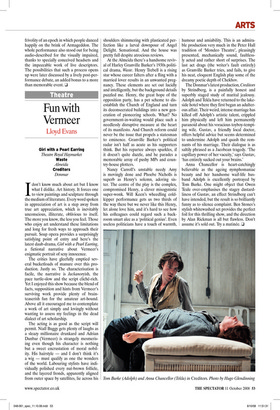Fun with Vermeer
Lloyd Evans
Girl with a Pearl Earring Theatre Royal Haymarket Waste Almeida Creditors Donmar
Idon’t know much about art but I know what I dislike. Art history. It forces one to view paintings and sculpture through the medium of literature. Every word spoken in appreciation of art is a step away from true art appreciation, which is inevitably unconscious, illiterate, oblivious to itself. The more you know, the less you feel. Those who enjoy art understand these limitations and long for fresh ways to approach their pursuit. Soap opera provides a surprisingly satisfying point of entry and here’s the latest daub-drama, Girl with a Pearl Earring, a fictional narrative about Vermeer’s enigmatic portrait of sexy innocence.
The critics have gleefully emptied several bucketloads of manure over this production. Justly so. The characterisation is facile, the narrative is Jackanoryish, the pace turtle-slow and the script cliché-rich. Yet I enjoyed this show because the blend of facts, supposition and hints from Vermeer’s surviving work provide plenty of brainteaserish fun for the amateur art-hound. Above all it encouraged me to contemplate a work of art simply and lovingly without wanting to assess my feelings in the dead dialect of art scholarship.
The acting is as good as the script will permit. Niall Buggy gets plenty of laughs as a sleazy millionaire drunkard and Adrian Dunbar (Vermeer) is strangely mesmerising even though his character is nothing but a sweet encrustation of moral nobility. His hairstyle — and I don’t think it’s a wig — must qualify as one the wonders of the world. Labouring stylists have individually polished every nut-brown follicle, and the layered fronds, apparently aligned from outer space by satellites, lie across his shoulders shimmering with plasticated perfection like a larval downpour of Angel Delight. Sensational. And the house was pretty full despite atrocious reviews.
At the Almeida there’s a handsome revival of Harley Granville Barker’s 1930s political drama, Waste. Henry Trebell is a rising star whose career falters after a fling with a married lover results in an unwanted pregnancy. These elements are set out lucidly and intelligently, but the background details puzzled me. Henry, the great hope of the opposition party, has a pet scheme to disestablish the Church of England and turn its deconsecrated buildings into a new generation of pioneering schools. What? No government-in-waiting would place such a needlessly disruptive measure at the heart of its manifesto. And Church reform could never be the issue that propels a statesman to eminence. Granville Barker’s political radar isn’t half as acute as his supporters think. But his repartee always sparkles, if it doesn’t quite dazzle, and he parades a memorable array of pushy MPs and country-house plotters.
Nancy Carroll’s unstable needy Amy is movingly done and Phoebe Nicholls is superb as Henry’s solemn, adoring sister. The centre of the play is the complex, compromised Henry, a clever misogynistic super-wonk. Will Keen’s wheedling coldkipper performance gets us two thirds of the way there but we never like this Henry, let alone love him, and it’s hard to see how his colleagues could regard such a backroom smart alec as a ‘political genius’. Even useless politicians have a touch of warmth, humour and amiability. This is an admirable production very much in the Peter Hall tradition of ‘Mondeo Theatre’, pleasingly presented, mechanically sound, faultlessly acted and rather short of surprises. The last act drags (the writer’s fault entirely) as Granville Barker tries, and fails, to give his neat, eloquent English play some of the dreamy poetic depth of Chekhov.
The Donmar’s latest production, Creditors by Strindberg, is a painfully honest and superbly staged study of marital jealousy. Adolph and Tekla have returned to the lakeside hotel where they first began an adulterous affair. Their weird, intense marriage has killed off Adolph’s artistic talent, crippled him physically and left him permanently paranoid about his voracious toyboy-tempting wife. Gustav, a friendly local doctor, offers helpful advice but seems determined to undermine Adolph and quash the remnants of his marriage. Their dialogue is as saltily phrased as a Jacobean tragedy. ‘The capillary power of her vacuity,’ says Gustav, ‘has entirely sucked out your brains.’ Anna Chancellor is heart-catchingly believable as the ageing nymphomaniac beauty and her handsome waif-life husband Adolph is excellently portrayed by Tom Burke. One might object that Owen Teale over-emphasises the stagey dastardliness of Gustav, an effect Strindberg can’t have intended, but the result is so brilliantly funny as to silence complaint. Ben Stones’s stylish whitewashed set provides the perfect foil for this thrilling show, and the direction by Alan Rickman is all but flawless. Don’t assume it’s sold out. Try a matinée. ❑










































































 Previous page
Previous page